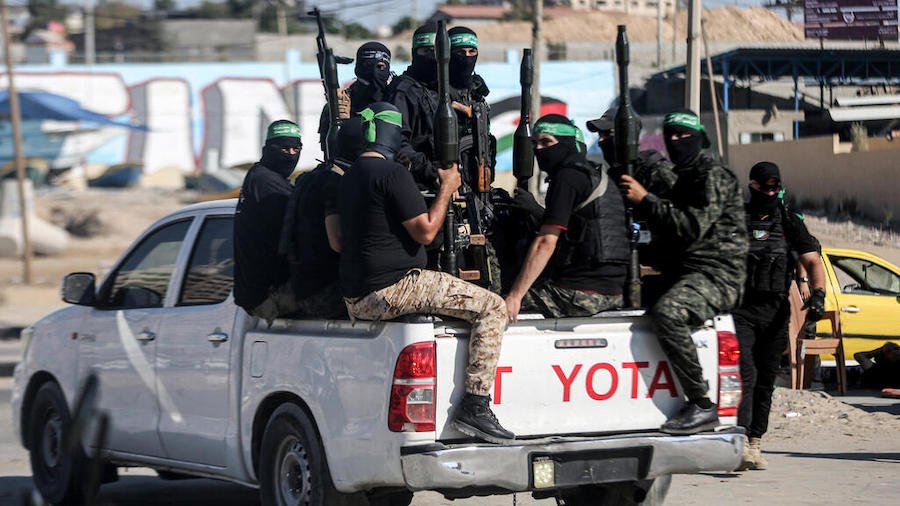Trucks run amok: Hamas has been using indestructible Toyota trucks for years

It was a Monday in October 2011, a little after ten in the morning. In Israel, hundreds of thousands gathered with great curiosity around the television screens to see the unbelievable spectacle they had been waiting for for five years and four months - the release of IDF soldier and Hamas prisoner, Gilad Shalit.
Shalit made his way to freedom, documented by the dramatic photographs from the Rafah crossing in the south of the Gaza Strip, as part of a long convoy that included no less than 19 white vans. They were all exactly the same, all Toyota Hiluxes. The goal of the terrorist operatives driving the vehicles, the brutal Al Qassam Brigades, was to deceive Israeli intelligence and make it difficult to identify Shalit who was sitting in one of those vans near Raed al Atar - the commander of the Rafah Brigade in the military arm of Hamas. He was the arch terrorist who was also known as one of the architects of the high-profile kidnapping.
The chilling appearance of the army of vans was not a surprise for Israeli intelligence. Already years before, Israel saw how the roads of the Palestinian enclave were beginning to be filled with the highly popular Japanese van. Some of them were cleverly smuggled through the Rafah tunnels when they were dismantled into pieces, others found their way to Gaza unhindered through the many car dealers. The well-known secret of the Middle East - that the Hilux is a durable, reliable and tough vehicle like no other - also worked its magic on the drivers of Gaza. This is a vehicle that hardly needs to be cared for.
Those who fell in love with the old Japanese van, which has been produced for over 50 years, were the murderous operatives of Hamas . Its glorious record as a vehicle with which you can go to war and even win, did not go unnoticed by the heads of the organization. They were well aware of the wonders wrought by Chad's inferior army with the help of vans in the late 1980s, when it was fighting for its life against a Libyan army armed with Soviet tanks and even helicopters - an army which on paper had absolute superiority on the battlefield.
The entire Middle East was amazed (and probably also in love) when it saw the simple-looking Toyota vans, with heavy machine guns and anti-aircraft and anti-tank weapons welded to the back, sweeping through the deserts of northern Chad - eliminating a clumsy Libyan army that sank into the deep sands with all its heavy equipment . The Libyans were caught by surprise against an agile and offensive guerrilla army that was equipped with only 400 vans. It was a motorized army that did not spare Gaddafi's humiliated soldiers on the battlefield.
Hamas, like other terrorist organizations in the region, saw and learned well the lessons of that war known today in the West as "The Great Toyota War." It was also an instructive lesson that showed Hamas that one day David might be able to prevail over Goliath again.
But there was something else about Toyota’s battered vans that charmed the terrorist organizations: their unfathomable durability. No matter how much you abuse them, neglect them and mess with them, the 'Nokia of vans,' as the Hilux is sometimes called, will always survive. It has the exact requirements for a vehicle designated by terrorists for attacks and border intrusions, acts of sabotage in enemy territory and the ability to escape.
In a durability test that the Hilux passed in the famous BBC program "Top Gear", it was proven that the vehicle is simply indestructible. Even after being sunk and having a trailer thrown at it, the rugged van still drove. It survived after being set on fire, being hit hard by a wrecking ball, and being exploded along with a multi-storey building which completely collapsed. It really must be seen to be believed. It is not certain that this was the original intention of the Japanese manufacturer, who, in general, sought to produce a vehicle that could compete with the durability and pricing of American vans, but terrorists around the world certainly felt that they had discovered the perfect vehicle for their needs.
The Hilux, which for many years has been considered a popular Hamas vehicle in the Gaza Strip, later also became the favorite pick-up truck of ISIS fighters throughout the Middle East.
During ISIS' heyday in the last decade, its fearsome pickup truck fleet numbered thousands of upgraded Hiluxes armed with the best machine guns. "The Hilux and the Land Cruiser have really become an integral part of the ISIS brand," claimed Mark Wallace, former U.S. ambassador to the United Nations, in an interview with the ABC television network.
The Americans, who in 2015 tried to get to the root of the matter, made an inquiry with Toyota managers who replied that they bore no responsibility. They rested the bulk of the blame on dubious local suppliers who were willing to sell the vans to anyone who could pay for them. The Japanese car giant has pledged to do everything possible to prevent its vehicles from falling into the hands of terrorist organizations in the future.
For at least two decades now, the Hilux has starred in Hamas' military parades. A terrorist weapon for all intents and purposes. It is also clearly visible in all the training videos for the brutal and painful attack of October 7th.
There is no need to say too much about its decisive role on that bloody day. The image of the white van loaded with terrorists - speeding through the streets of Sderot freely, while raining fire on passers-by indiscriminately - will never be forgotten in Israel.
Related News
